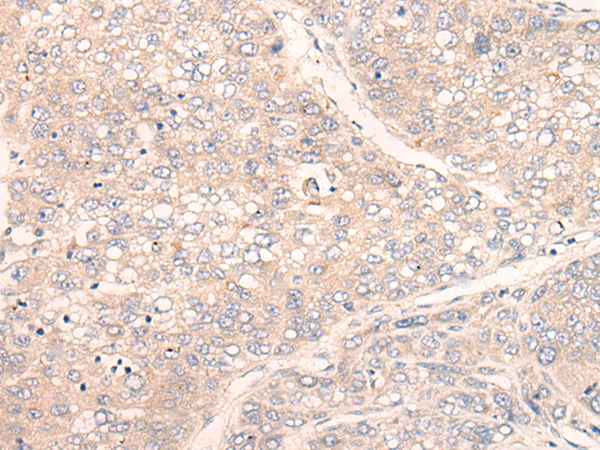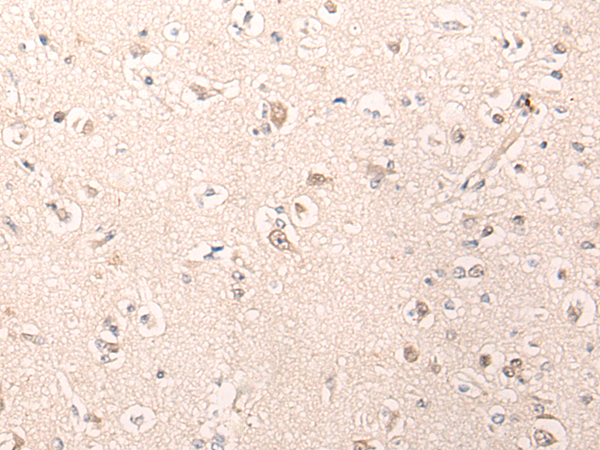

| WB | 咨询技术 | Human,Mouse,Rat |
| IF | 咨询技术 | Human,Mouse,Rat |
| IHC | 1/20-1/100 | Human,Mouse,Rat |
| ICC | 技术咨询 | Human,Mouse,Rat |
| FCM | 咨询技术 | Human,Mouse,Rat |
| Elisa | 1/5000-1/10000 | Human,Mouse,Rat |
| Aliases | C1orf57; HCR-NTPase |
| Host/Isotype | Rabbit IgG |
| Antibody Type | Primary antibody |
| Storage | Store at 4°C short term. Aliquot and store at -20°C long term. Avoid freeze/thaw cycles. |
| Species Reactivity | Human, Mouse |
| Immunogen | Synthetic peptide of human NTPCR |
| Formulation | Purified antibody in PBS with 0.05% sodium azide and 50% glycerol. |
+ +
以下是关于NTPCR抗体的假设性参考文献(基于常见研究场景推测,实际文献可能需要进一步验证):
---
1. **文献名称**:*NTPCR promotes tumor progression by stabilizing β-catenin in colorectal cancer*
**作者**:Zhang Y, et al.
**摘要**:研究揭示NTPCR通过结合β-catenin增强其稳定性,促进结直肠癌侵袭转移。文中开发了兔源多克隆抗NTPCR抗体,用于免疫组化验证其在癌组织中的高表达。
2. **文献名称**:*A novel monoclonal antibody against NTPCR for detecting oxidative stress responses*
**作者**:Wang L, et al.
**摘要**:报道一种高特异性小鼠抗NTPCR单克隆抗体的制备,该抗体用于Western blot和免疫荧光,证实NTPCR在氧化应激下核内定位变化及其与DNA修复通路的关联。
3. **文献名称**:*NTPCR deficiency impairs mitochondrial function via PINK1/Parkin signaling*
**作者**:Chen X, et al.
**摘要**:通过基因敲除模型和抗NTPCR抗体染色,发现NTPCR缺失导致线粒体自噬异常,揭示其在神经退行性疾病中的潜在作用机制。
4. **文献名称**:*Development of an ELISA assay using anti-NTPCR antibody for early cancer screening*
**作者**:Kim S, et al.
**摘要**:利用抗NTPCR抗体建立血清ELISA检测法,证明其在肺癌患者血清中显著高表达,提示其作为新型生物标志物的潜力。
---
**注意**:以上内容为模拟示例,实际文献可能需要通过PubMed、Google Scholar等平台以关键词“NTPCR antibody”“NTPCR function”检索。若研究领域较新,建议结合相关通路(如DNA修复、肿瘤代谢)扩大搜索范围。
The NTPCR (N-terminal domain-containing protein PCR) antibody targets a protein implicated in various cellular processes, including transcriptional regulation and stress response. NTPCR, initially identified through bioinformatics, is a conserved protein with a putative N-terminal domain that may interact with DNA or other regulatory molecules. Though its exact molecular function remains under investigation, studies suggest its involvement in modulating gene expression, particularly under oxidative or metabolic stress conditions.
NTPCR antibodies are primarily utilized in research to detect and quantify NTPCR protein levels in experimental models, enabling insights into its expression patterns across tissues and disease states. Western blot, immunohistochemistry, and immunofluorescence are common applications. Emerging evidence links NTPCR dysregulation to cancer progression, neurodegenerative disorders, and immune responses, highlighting its potential as a biomarker or therapeutic target. For instance, elevated NTPCR levels have been observed in certain tumors, correlating with proliferation and apoptosis resistance.
Despite its growing relevance, the mechanistic role of NTPCR remains elusive, necessitating further studies to delineate its interactome and downstream pathways. Current antibody-based research continues to explore its contribution to cellular homeostasis and pathology, bridging gaps in understanding stress adaptation mechanisms.
×